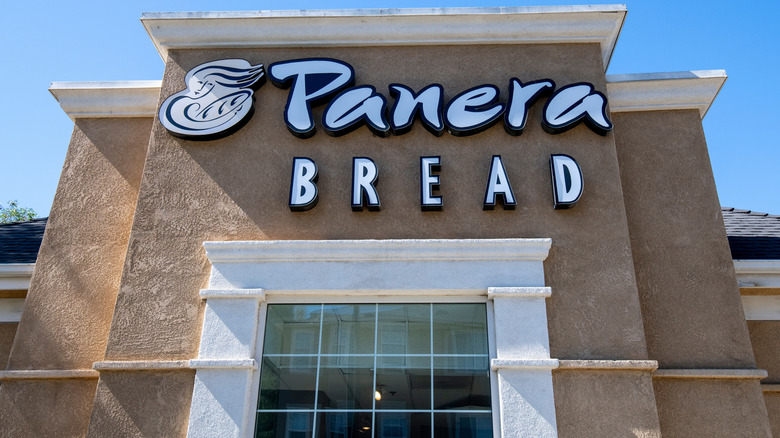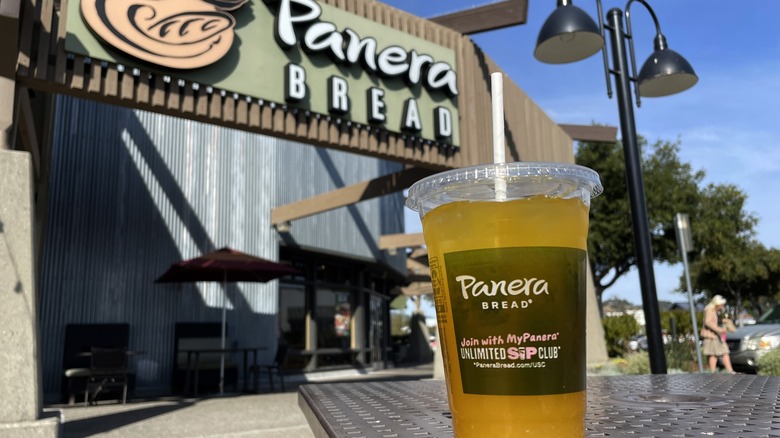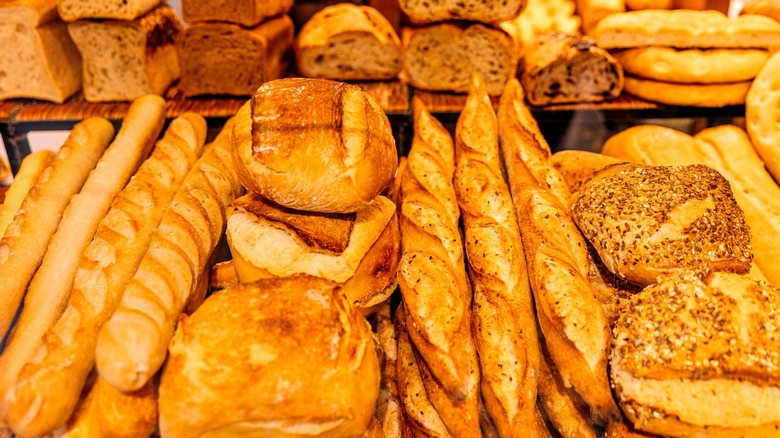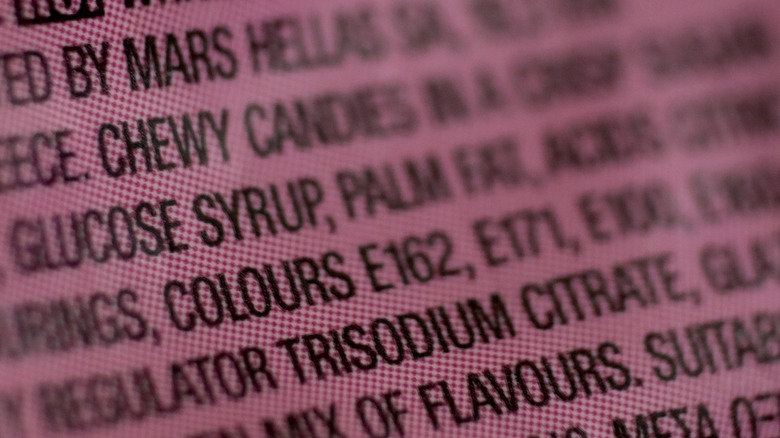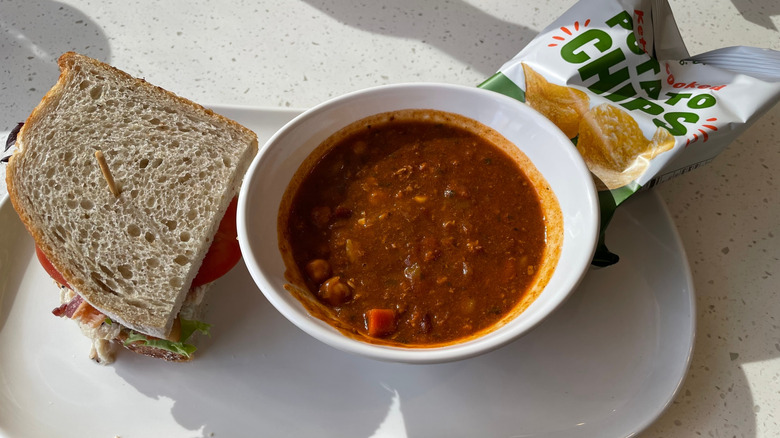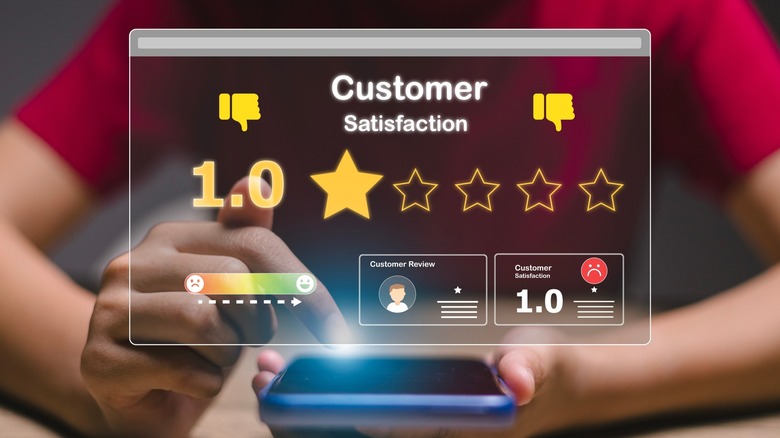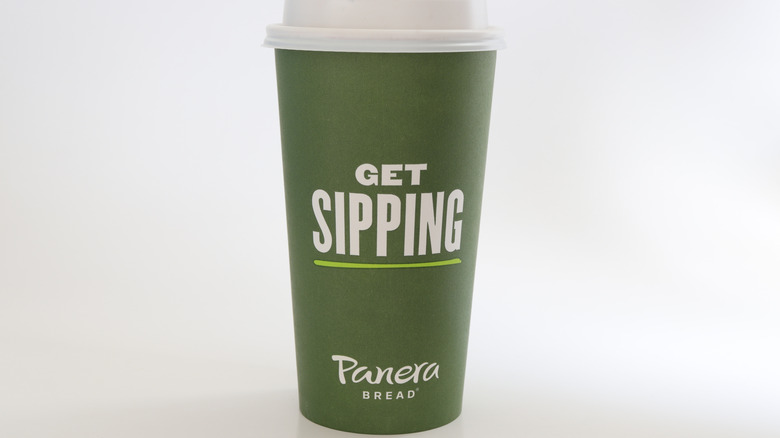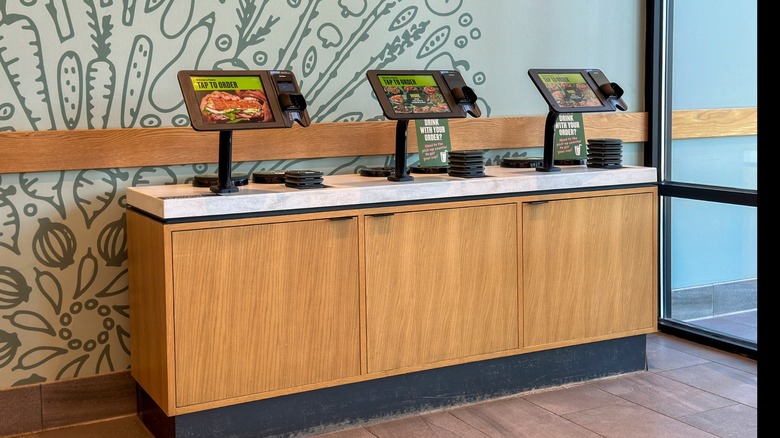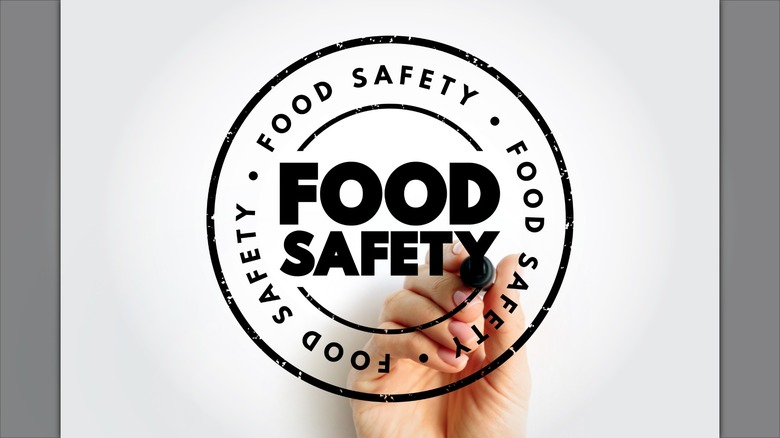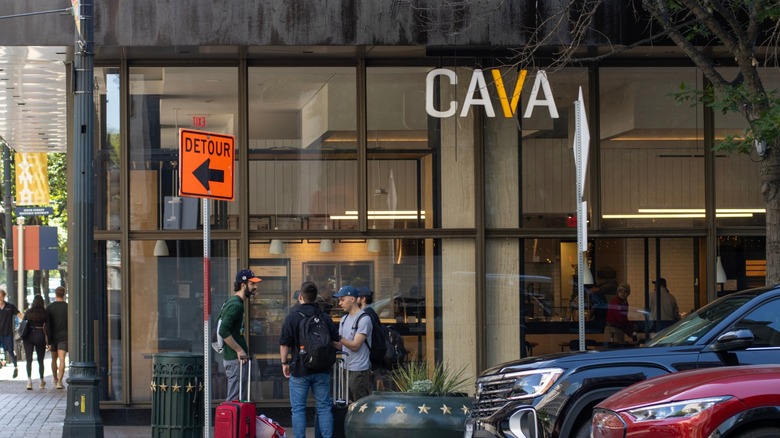The Only Recap Of Panera's Downfall You Need
Remember when Panera was the place to grab a warm sourdough bread bowl and feel just a little bit fancy while doing it? Those days feel like a lifetime ago. What was once the go-to hangout for students, remote workers, and carb lovers everywhere has been spiraling in slow motion. Basically, it's become a case study in how to take a beloved brand and, piece by piece, unravel it.
Panera's story isn't about one big scandal or a single colossal corporate blunder. As T. Swift would say: It's "death by a thousand cuts," from questionable ownership decisions to corners cut so deep they practically changed the recipe book. And then there were the lawsuits piling up like unwashed dishes, and a steady drift from the identity that made people love it in the first place.
We have all been sitting in front-row seats, witnessing what happens when a company forgets the simple equation that built its success: serve good food, treat people well, and stay true to your brand. Ignore those basics long enough, and customers will wave goodbye. So, grab your metaphorical bread bowl and settle in. We're about to walk through the cautionary tale of Panera's not-so-secret downfall — the missteps, the mayhem, and the lessons any business (or bread enthusiast) can take away. Think of this less like a funeral and more like a playbook of "what not to do" if you want your brand to survive.
The Charged Lemonade deaths
Panera's experiment with highly caffeinated drinks ended in one of the most damaging chapters of its recent history. The "Charged Lemonade," rolled out as a refreshing energy alternative, contained caffeine levels comparable to multiple cups of coffee combined with other stimulants. The train(wreck) left the station when it was promoted like a health-forward lemonade, placed beside iced teas and fruit drinks rather than with energy beverages.
The marketing disconnect had serious consequences. By 2023, the drink was linked to two deaths and multiple injuries, leading to a wave of lawsuits. Families of the victims argued that Panera failed to warn customers about the risks, especially for those with underlying health conditions. Critics noted that the brand's own positioning as a "clean" and wellness-oriented company made the rollout especially troubling — customers didn't expect a hidden jolt of stimulants in something labeled as lemonade.
In July 2024, Panera settled the remaining lawsuits and quietly pulled Charged Lemonade from its menu. But the reputational damage was done. What could have been a quirky menu innovation became instead a symbol of misleading marketing and corporate miscalculation. With the brand already struggling to keep trust with its base, this episode cemented the sense that Panera had lost sight of the responsibility that comes with selling "food as it should be".
Discontinuing fresh, in-house bread production
Panera's name translated from Latin is "bread basket," but the company has moved further away from the product that once defined it. For decades, each Panera café baked bread fresh daily, a signature feature that separated Panera from standard fast-food chains. That changed when the company announced the closure of its last fresh dough facilities. Instead of bakers kneading dough overnight, stores now rely on frozen, partially baked bread shipped in from external suppliers.
The shift was framed as efficiency and modernization, but many saw it as a blow to quality and authenticity. Longtime customers and employees alike noted that the fresh-baked bread, once a hallmark of Panera's identity, had been replaced by something more generic. Online forums filled up with complaints that the bread no longer carried the same texture or flavor, and was disappointing to say the least.
Behind the scenes, this move also meant layoffs for trained bakers, further eroding the company's culture. What used to be a proud ritual of craftsmanship (bread baked on-site as the centerpiece of the café) was reduced to a reheating process. For a company once built on a fresh food model, outsourcing the bread felt like more than cost-cutting. It felt symbolic of an abandoning of the very foundation that gave Panera its name.
Compromised clean ingredients
Panera has carved out its niche by promising "clean" ingredients — eschewing artificial preservatives (on its own list) and promoting responsibly sourced proteins. This commitment was a powerful differentiator in a crowded fast-casual market. But as costs rose and ownership pushed for efficiency, the brand quietly began loosening those standards.
Ahead of a 2024 menu relaunch, the company removed certain signage such as the mention of "hormones," and relaxed its sourcing practices, particularly for turkey and pork. Animal welfare commitments were scaled back, and reports suggested the brand could no longer guarantee antibiotic-free meat. These changes weren't heavily publicized, but customers and industry watchers noticed.
The decision was not simply about recipes, but was more about trust. Panera had spent years telling customers that food should be transparent and wholesome, only to roll back those values when margins tightened. Analysts noted that the company appeared to gamble that its reputation would shield it from backlash. Instead, the move fueled criticism that Panera was erasing the very pillars that once made it stand out. In trying to save money, the company damaged a promise that can't easily be restored.
Overpriced, small portions
One of the most consistent customer complaints about Panera today is that the food no longer feels worth the cost. Prices have steadily climbed, but portions have gone in the opposite direction. Diners describe soups served in shallow cups, sandwich meat cut thinner than ever, and salads that barely fill the bowl.
On forums and social media, comparisons to hospital meals are common, and nostalgia for the generous portions of the 2000s runs deep. Some customers admit they stopped going altogether because paying premium prices for skimpy servings feels like being shortchanged.
This erosion of value has struck at the heart of Panera's appeal. The chain once positioned itself as affordable comfort food — a place where you could linger over a satisfying meal without breaking the bank. Now, customers report feeling nickel-and-dimed. Already plagued with lawsuits, declining food quality, and a battered identity, shrinking portions only deepen the perception that Panera has turned away from serving people well. At a time when competitors are offering larger meals at lower prices, Panera risks being remembered not for bread bowls, but for charging more while delivering less.
Drastic menu overhaul
In 2024, Panera attempted to simplify operations with a sweeping menu overhaul. Countless items disappeared, including some of fans most beloved options. For customers who had developed rituals around specific meals, the loss of certain Panera menu items felt abrupt and dismissive.
To add insult to injury, the replacement menu items were ... underwhelming. While Panera introduced a handful of lower-cost items, fans argued that the variety and creativity that once made the Panera menu special had vanished. Online discussions captured the frustration: customers missed unique Panera bagel flavors, fruit drinks, and seasonal favorites that never returned. For many, Panera no longer felt like a place to explore new tastes but rather a stripped-down version of its former (awesome) self.
The overhaul might have cut costs and simplified supply chains, but it alienated loyal guests. Menu innovation had long been a strength of the brand. It's a huge reason why people came, for the sense of choice and discovery. Removing those options left the chain looking generic at best, looking careless at worst, and to be brutally honest: looking just like every other mediocre brand. In trying to streamline, Panera overlooked a simple truth: sometimes, what keeps customers coming back isn't efficiency, but the comfort of knowing their favorites will always be there waiting for them, like a delicious, dependable (and edible) hug.
Poor customer service
As Panera cut costs across operations, customer service quickly became another casualty. Complaints to the Better Business Bureau and online forums tell a consistent story marked by incomplete or incorrect orders, delivery failures, and difficulty securing refunds. For many customers, even minor mistakes escalated into lengthy frustration because managers and staff seemed unable, or unwilling, to resolve issues.
Part of the problem stemmed from staffing reductions. Fewer employees in cafés meant longer wait times and less attention to detail. Customers described interactions that felt rushed or dismissive, with little accountability when problems arose. The once-welcoming environment of Panera cafés was increasingly replaced by an impersonal, transactional atmosphere (all those kiosks suddenly popping up everywhere, anyone?).
Poor service compounds other frustrations. Smaller portions or missing items sting even more when customers feel brushed off by staff. For a brand that once thrived on being a "third place" between home and work, service failures have undercut its entire value proposition. Panera was never just about food, but also prided itself on offering the experience of enjoying meals in a space that felt reliable and hospitable. Losing that touch has left many customers not only disappointed but unwilling to return.
Frustrating subscription model (Sip Club)
Panera's Unlimited Sip Club, introduced as a bold experiment in recurring revenue, has instead become a source of customer backlash. The pitch was enticing: unlimited coffee, tea, and fountain drinks for a flat monthly fee. But complaints soon surfaced about confusing terms and aggressive auto-renewals.
Some subscribers reported being charged even after canceling, while others struggled to find a straightforward way to end their memberships at all. Lawsuits alleged that the "unlimited" aspect was misleading, and privacy concerns were raised about how the program tracked customer data. Rather than building loyalty, the program left many feeling tricked or trapped.
The frustration over Sip Club highlights a broader pattern: Panera's recent initiatives often prioritize short-term gains over long-term trust. A subscription program can only succeed if customers believe it adds genuine value. Instead, Panera's execution reinforced the narrative that the company is more focused on squeezing money from its base than delivering the experience it once promised. Panera was already facing skepticism, and Sip Club became another example of how even well-meaning ideas can backfire when rolled out with poor transparency and customer care.
Negative ambiance
For years, Panera thrived on being a comfortable spot between home and work where people could relax, study, or meet over a bread bowl. But that atmosphere has steadily eroded. In pursuit of efficiency, Panera cafés have leaned heavily into kiosks, mobile ordering, and drive-thrus. While convenient, these changes stripped away much of the warmth that once defined the brand.
Customers now describe the cafés more along the lines of being cold, generic, and often unkempt. Some point to the automated drive-thru ordering system, with its robotic voice, as the clearest sign of a shift from hospitality to impersonal. Inside, the décor and vibe feel less like a neighborhood café and more like a high-traffic pit stop (again, you multiple self-serve ordering kiosks, we are looking at you).
What's striking is how quickly ambiance fell from being a competitive advantage to a liability. When Panera first rose to prominence, people were willing to pay a little more because the space itself added value for them. It was clean, cozy, and inviting. Losing that environment has made rising prices and shrinking portions sting even more. Without the welcoming backdrop, the food stands alone, and many diners no longer feel it justifies the trip, or price tag.
Food safety concerns
Food safety issues have a way of sticking in customers' minds, and Panera has not been immune. In 2018, the company recalled all cream cheese products after tests revealed potential listeria contamination. That same year, Panera was named in lawsuits tied to an E. coli outbreak traced back to romaine lettuce, which left dozens sick across multiple states.
Although Panera moved quickly to address the problems — pulling products, conducting testing, and cooperating with regulators — the damage was already done. The incidents undercut the company's positioning as a brand built on health and trust. And when you have marketed your brand as safer and more wholesome than typical fast food, headlines linking your name to listeria and E. coli will leave a lasting impression, and not a good one.
The recalls are years behind Panera now, but the shadow remains. Consumers may forgive mistakes, but when it comes to foodborne illness, memories are slow to fade. Each new stumble, whether with quality or customer service, reinforces those earlier concerns. In an industry where safety and trust are non-negotiable, Panera's past failures still color perceptions of the brand today.
Data breach and settlement
In 2024, Panera faced another type of crisis, this time involving data security. A breach compromised the personal information of employees and some customers, including sensitive details that should have been protected. News of the incident fueled concerns not only about corporate oversight but also about the company's broader commitment to safeguarding all those who interact with its brand.
The fallout was costly. Panera later agreed to a $2.5 million class-action settlement to resolve claims of negligence. While that figure may seem small compared to the revenue of a national chain, the reputational hit was far greater. For customers, the breach signaled that Panera's problems extended beyond food quality and service. For employees, it raised questions about whether the company valued their privacy and security.
Today more than ever, with the popularity of digital ordering and loyalty programs, data protection feels increasingly important, and Panera's misstep suggested a lack of preparedness. The settlement may have closed the legal chapter for the brand, but the underlying issue of eroded trust still lingers. A café might recover from a bad meal or a service slip, but rebuilding confidence after exposing personal data is a much harder task.
Increased competition
Panera helped pioneer the fast-casual category, offering fresher, higher-quality food than traditional fast food. But the landscape has changed, and Panera has struggled to keep up. Chains like Cava, Sweetgreen, and Chipotle have surged ahead, drawing younger, health-conscious diners with bold flavors, customizable menus, and a stronger sense of value. Even traditional competitors like Shake Shack have carved out loyal followings by doubling down on quality and consistency.
Industry reports highlight how the fast-casual segment grew, even as inflation pressured consumers. Many brands managed to thrive by innovating and responding to shifting preferences. Panera, by contrast, seemed to stagnate. Its pared-down menu, smaller portions, and higher prices left it looking less like a category leader and more like a chain coasting on old reputation.
The result has been lost market share and fading cultural relevance. Where Panera once felt modern and aspirational, it now feels dated compared to vibrant competitors. Customers looking for healthier bowls, premium sandwiches, or inventive menus have plenty of alternatives, and Panera hasn't given them a compelling reason to stay loyal and keep returning.
Corporate cost-cutting under JAB
Panera's decline is closely tied to its ownership under JAB Holding Company. Since acquiring the chain, JAB has pursued an aggressive cost-cutting strategy, prioritizing efficiency and profit margins over customer experience. On paper, the measures made sense: shrink portions, simplify menus, renegotiate sourcing, and reduce labor costs. In practice, these decisions hollowed out the qualities that once set Panera apart.
Customers quickly noticed the changes. Bread no longer tasted as fresh, ingredients lost their "clean" assurance, and prices kept rising. Employees felt the squeeze too, as layoffs and reduced staffing made service increasingly inconsistent. On forums and social platforms, the public outcry was loud.
This private-equity approach may have boosted short-term returns, but it eroded long-term loyalty. Panera's reputation was built on a balance of quality, hospitality, and value. Under JAB's watch, that balance tipped heavily toward the bottom line. The result is a brand that still carries name recognition but far less affection. In customers´ eyes, sadly, Panera today feels less like the warm "bread basket" of the past and more like a shell of its former self.
